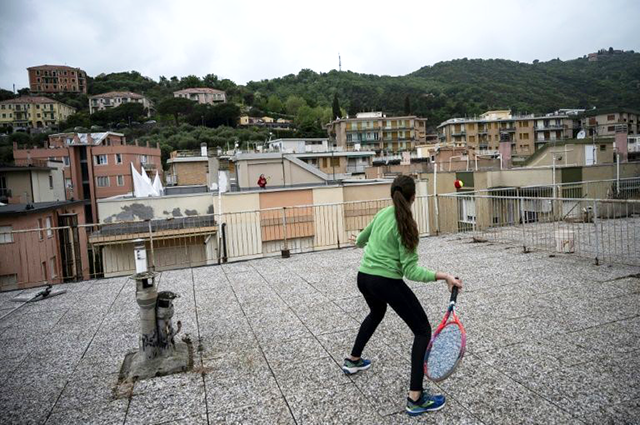- International News
- Mon-2020-04-27 | 03:32 pm

Conte told La Repubblica newspaper that he will spell out the full details of how Italy will ease its way out of the world's longest active coronavirus lockdown by the start of next week.
He has reportedly been presented with a cautious proposal that involves a gradual lifting of restrictions over the course of May.
Italy's official death toll of 26,384 is Europe's highest and only second globally to the United States.
But its number of cases has been ebbing and Italy believes its contagion rate -- reported at between 0.2 and 0.7 -- is low enough below the key threshold of 1.0 to try and get back to work.
"We cannot continue beyond this lockdown -- we risk damaging the country's socioeconomic fabric too much," Conte told La Repubblica.
'Very high risk'
Italy gradually closed everything over the first half March as it became increasingly clear that an initial batch of cases in northern areas around Milan was spreading.
Scientists now believe that Italy's infections probably began in January -- if not earlier -- and that the virus was running rampant by the time the first official COVID-19 death was recorded on February 21.
But Italy's health care system held the line and Conte now appears to feel safe enough to focus on mending an economy that his team expects to shrink by eight percent this year.
Conte said his government will "allow a large number of companies" to restart on May 4.
Italy's schools were closed before most other businesses and will now be one of the last to reopen.
He said the return to school was filled with peril because many teachers were older and at greater risk of catching the virus.
"Schools are at the centre of our attention and will reopen in September," the premier said.
Conte explained that resuming tuition before then involved "a very high risk of contagion".
'Greater freedom'
Many Italians are most concerned about when they will finally be able to walk in parks and jog without being stopped and fined by the police.
Italy's stay-at-home orders were announced nationally on March 9 and require everyone to stay within about a block of their front door.
Many have turned their roofs into improvised gyms and even tennis courts in a collective effort to avoid going stir crazy.
"We are not yet in a position to restore full freedom of movement, but we are studying a relaxation of the current, strict regime," Conte said.
"We will make sure to allow greater freedom of movement while maintaining our guarantee to prevent and contain contagion."
Media reports say the government might allow people to move freely within cities but limit their travel between the country's 20 regions.
Conte was also reportedly considering the option of outfitting airports and train stations with thermal scanners that can flag people who are running fevers.
But Conte cautioned against expecting bars and restaurants to open their doors in May -- or tourists returning this summer.
"We will be reviewing our social distancing rules," said Conte.
"But this does not mean that we will be abandoning them."













